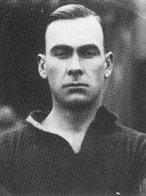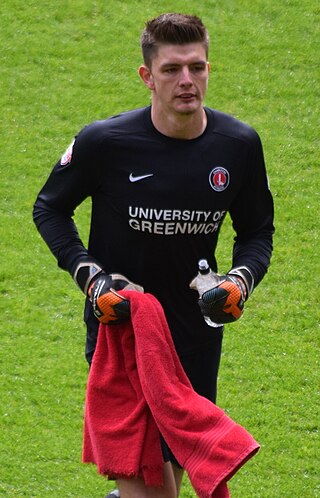Related Research Articles

Bradley Howard Friedel is an American professional soccer coach and former player who played as a goalkeeper.

Raymond Neal Clemence was an English professional footballer who played as a goalkeeper. Regarded as one of the greatest goalkeepers of all time, he is one of few players to have made over 1,000 career appearances, and holds the record for the most clean sheets in the history of football (460).

Philip Bernard Thompson is an English retired footballer, who played as a defender for Liverpool team of the 1970s and 1980s. During this time, he also represented the England national football team on 42 occasions, and captained England on six occasions. After retiring as a player, he later served Liverpool as assistant manager and, during the 2001–02 season, acted as caretaker for 6 months while manager Gérard Houllier was ill. He was a pundit on Soccer Saturday on Sky Sports for 22 years until August 2020, does on and off work as a pundit for TV 2 (Norway), and is a regular Visiting Fellow at the University of Liverpool where he teaches on the Football Industries MBA.

Kevin Duncan MacDonald is a Scottish former footballer who is the former manager of Swindon Town and caretaker manager of Aston Villa on three occasions. As a player MacDonald was a member of the Liverpool "double" winning side of 1986.

José Manuel "Pepe" Reina Páez is a Spanish professional footballer who plays as a goalkeeper for Serie A club Como.
The 1987–88 season was the 108th season of competitive football in England.

Gordon Hodgson was a professional sportsman, born in Transvaal Colony, who is best known as a striker for Liverpool and as a fast bowler for Lancashire. He won two international caps for South Africa and three for England.

Alan Geoffrey Wright is an English football manager and former professional footballer.
Garry Stuart Parker is an English football coach and former professional player who is an assistant coach for Omonia.
Gary Walsh is an English football coach and former professional player who is a goalkeeping coach at EFL League Two club Port Vale. He played as a goalkeeper in a 21-year professional career, making 282 league and cup appearances. He was also capped twice at England U21 level.
Ronald Guinness Orr Gunion was a Scottish footballer, who played for Newcastle United and Liverpool amongst others in the early 20th century. He played twice for Scotland in 1902 and 1904, scoring one goal.
Kenneth Campbell was a Scottish footballer, who played as a goalkeeper for Liverpool, Partick Thistle, New Brighton, Stoke City and Leicester City. Campbell also played in eight full international matches for Scotland between 1920 and 1922.
Thomas Jackson was an English footballer who played as a goalkeeper. He made close to 200 competitive appearances for Aston Villa, taking over from Sam Hardy when the veteran English international moved to Nottingham Forest.
The 1992–93 Southampton F.C. season was the club's 92nd season of competitive football, their 23rd in the top flight of English football, and their first in the FA Premier League following its replacement of the First Division as the top flight. After a poor first season with manager Ian Branfoot in which the club finished 16th in the final year of the old First Division, the Saints faired even worse in the inaugural Premier League campaign, finishing 18th and avoiding relegation by a single point. Outside the league, the club were knocked out of both the FA Cup and the League Cup in only the third round.

Samuel Luke Johnstone is an English professional footballer who plays as goalkeeper for Premier League club Wolverhampton Wanderers and the England national team.
The 1979–80 season was Aston Villa's 80th in the Football League and their fifth consecutive season in the top division.

Nicholas David Pope is an English professional footballer who plays as a goalkeeper for Premier League club Newcastle United and the England national team.
The 1894–95 season was the third season in Liverpool F.C.'s existence, and was their second year in The Football League, in which they competed in the First Division for the first time. The season covers the period from 1 July 1894 to 30 June 1895.
The 1937–38 season was the 43rd season of competitive football by Southampton and the club's 16th in the Second Division of the Football League. Despite an appalling start which saw the side spend much of the first month of the campaign in the relegation zone, the Saints finished the season 15th in the league table – their highest position in four years. With manager Tom Parker entering his first full season as Southampton manager, the club made a large number of signings in the summer, including high-scoring winger Harry Osman and young inside-forward Ted Bates, who would go on to make over 200 appearances for the club and serve as manager for almost 20 years. Southampton finished the 1937–38 season with 15 wins, nine draws and 18 losses, six positions but just three points above the first relegation place.
The 1920-21 English football season was Aston Villa's 29th season in The Football League.
References
- 1 2 "Samuel Hardy | Service Record". Football and the First World War. Retrieved 6 December 2018.
- ↑ "FreeREG database - Sam Hardy Baptism: St John the Evangelist, Newbold, Derbyshire, 2 January 1883. Reg No.1504". FreeREG. Free UK Genealogy. Retrieved 4 August 2024.
- 1 2 "Chesterfield FC: Player-based information – 1899–1909" . Retrieved 6 December 2018.
- ↑ Trentsider (21 August 1922). "Few big transfers in the First Division of the Football League. Nottingham Forest". Athletic News. Manchester. p. 5.
- 1 2 3 "Players - Sam Hardy: Appearances: Other Clubs" . Retrieved 4 August 2024– via LFCHistory.net.
- ↑ "Players - Sam Hardy: Appearances" . Retrieved 4 August 2024– via LFCHistory.net.
- 1 2 3 "Sam Hardy" . Retrieved 4 August 2024– via Football And The First World War.
- ↑ "FA Legacy Number 321: Sam Hardy" . Retrieved 4 August 2024– via Englandstats.com.
- 1 2 3 4 5 "Chesterfield | Club | Past Players | Past Players | Sam Hardy". Archived from the original on 15 April 2012. Retrieved 6 December 2018.
- ↑ Basson, Stuart (1998). Lucky Whites and Spireites. p. 80. ISBN 1874427-03-8.
- ↑ "Sam Hardy Ill. Famous Goalkeeper's Critical Condition". Sheffield Independent. 3 October 1925. p. 7 – via British Newspaper Archive.
- ↑ "Archives: Match Details from Liverpool - Chesterfield played on Saturday 7 January 1905" . Retrieved 7 August 2024– via LFCHistory.net.
- ↑ Rippon, Anton (2020). Liverpool: The Story of a Football Club in 101 Lives. Barnsley: Pen & Sword White Owl. p. 33. Retrieved 1 August 2024– via Google Books.
- ↑ "Football: Important Capture by Liverpool. Sam Hardy Signed On" . Liverpool Evening Express. 18 May 1905. p. 7. Retrieved 7 August 2024– via Findmypast.
- ↑ "Variety of Questions" . The Derbyshire Times. 14 October 1905. p. 11. Retrieved 6 August 2024– via Findmypast.
- 1 2 "Players - Sam Hardy: Player Profile" . Retrieved 6 August 2024– via LFCHistory.net.
- ↑ "Transfers for the 1905-1906 season" . Retrieved 6 August 2024– via LFCHistory.net.
- ↑ "Managers: Tom Watson: Players bought" . Retrieved 6 August 2024– via LFCHistory.net.
- 1 2 Williams, John (2011). Red Men: Liverpool Football Club - The Biography. London: Random House. p. 93. Retrieved 6 August 2024– via Google Books.
- ↑ "Careers of Famous Footballers: Sam Hardy". Sunderland Daily Echo. 29 April 1913. p. 3 – via British Newspaper Archive.
- ↑ "Liverpool v. Nottingham Forest". Nottingham Journal. 21 October 1905. p. 8 – via British Newspaper Archive.
- ↑ "Liverpool v Nottingham Forest, 21 October 1905" . Retrieved 2 August 2024– via 11v11.com.
- ↑ "Sam Hardy: Club Matches: Liverpool" . Retrieved 2 August 2024– via 11v11.com.
- ↑ "Liverpool league performance history: League Division One table at close of 1905-06 season" . Retrieved 2 August 2024– via 11v11.com.
- ↑ Goodwin, Chris; Isherwood, Glen (29 November 2022). "England Match No.89 - Ireland - 16 February 1907". England Football Online. Retrieved 2 August 2024.
- ↑ "Appearances by Sam Hardy under Tom Watson" . Retrieved 3 August 2024– via LFCHistory.net.
- ↑ "Players - Sam Hardy: Clean sheets per season" . Retrieved 3 August 2024– via LFCHistory.net.
- ↑ "Villa's Capture. International Goalkeeper Signed On". Birmingham Daily Gazette. 15 June 1912. p. 8 – via British Newspaper Archive.
- ↑ "Aston Villa v Chelsea, 02 September 1912" . Retrieved 3 August 2024– via 11v11.com.
- ↑ "Sam Hardy: Club Matches: Aston Villa" . Retrieved 3 August 2024– via 11v11.com.
- ↑ Jackson, Alexander (2022). Football's Great War: Association Football on the English Home Front, 1914–1918. Barnsley: Pen & Sword Military. p. 178. Retrieved 6 August 2024– via Google Books.
- ↑ "Player#237: Sam Hardy" . Retrieved 5 August 2024– via AVFC History.co.uk.
- ↑ "Sam Hardy Transferred. Famous Villa Goalkeeper To Play With Forest". Sporting Chronicle. 19 August 1921. p. 6 – via British Newspaper Archive.
- 1 2 Wright, Don (2016). Clough and Walker: Forest's Greatest Managers. Stroud: Amberley Publishing Limited. p. 19. Retrieved 5 August 2024– via Google Books.
- ↑ "Sam Hardy: Club Matches 1924/25" . Retrieved 4 August 2024– via World Football.net.
- ↑ Goodwin, Chris; Isherwood, Glen (8 December 2022). "England Players – Sam Hardy". England Football Online. Retrieved 1 August 2024.
- ↑ Goodwin, Chris; Isherwood, Glen (14 July 2024). "England's Goalkeepers by Number of Clean Sheets". England Football Online. Retrieved 3 August 2024.
- ↑ "The Notts Clubs. New Men For The County And The Forest". Daily News. 4 August 1925. p. 10 – via British Newspaper Archive.
- 1 2 3 4 Simkin, John. "Sam Hardy". Spartacus Educational. Retrieved 10 August 2014.
- ↑ Chapman, Herbert (2010) [1934]. Herbert Chapman on Football: The reflections of Arsenal's Greatest Manager. Downham Market: GCR Books Limited. p. 35. Retrieved 5 August 2024– via Google Books.
- ↑ "BBC News – Football – Legends list in full". news.bbc.co.uk. Retrieved 6 December 2018.
- ↑ 100 Players Who Shook The Kop Archived 12 December 2013 at the Wayback Machine
- ↑ Platt, Mark (25 May 2006). "100 PWSTK – No.94: Sam Hardy". Liverpool F.C. Archived from the original on 12 August 2014. Retrieved 10 August 2014.
- ↑ "Nottingham Forest at 150: Flashback: The men that managed the Reds from 1912 to 1939". 3 November 2015. Archived from the original on 7 November 2015. Retrieved 21 September 2016.
- ↑ "Getting Personal | Goalkeepers are Different". www.goalkeepersaredifferent.com. Retrieved 6 December 2018.